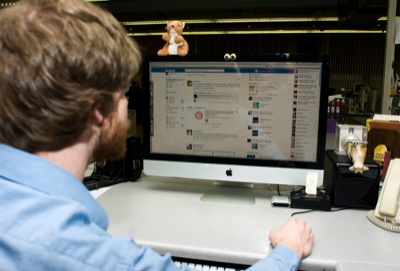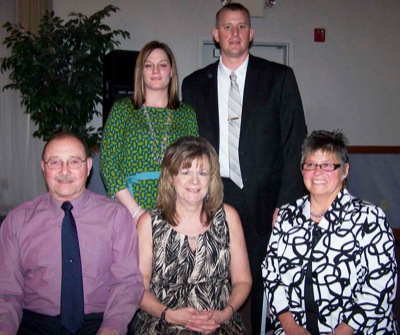Friday, March 1st, 2013
'Like' it or not
Selective protection for social media
By Eric Adams

Photo by Mark Pummell/The Daily Standard
Social media sites have connected over a billion people around the world, but some warn that employees should exercise discretion when using them to avoid scrutiny or even termination from the workplace.
Employees losing their jobs over controversial social media activity is becoming more common in our increasingly connected world.
These cases have brought the old question of constitutionally-protected speech to the foreground and introduced a new question of privacy.
Celina attorney Matt Gilmore has yet to represent any clients in a social media case but said that, to his knowledge, "whistle-blowing" is the only accusatory speech that grants workers absolute legal protection. That type of speech includes any instance where an employee accurately indicts his or her employer or coworker for illegal practices on the job.
Gilmore disagrees with the frequent portrayal of Facebook-related firings as First Amendment violations.
"The First Amendment grants the right of speaking out against the government, but if it's an employee going on Facebook and saying (profane insults), that's the balancing act," Gilmore said. "You can say it all you want, but they don't have to continue employing you.
"It's probably going to be a lot like determining what pornography is," Gilmore added. "It's in the eye of the beholder."
Carolyn Davis handles a large volume of social media cases as an attorney at Bugbee & Conkle, a Toledo law firm. She also has spoken at many seminars in the Lima area, advising employers on company policies.
Davis described social media legislation as a "slippery slope," saying that whenever a concrete policy is developed, it becomes stale within about two months.
According to Davis, "consorted activity" is one key to legal protection.
She illustrated the hypothetical of an employee asking an open-ended question online such as "who has had problems with (supervisor X) regarding overtime?"
"It's saying (your message) to an audience that matters," Davis said. "This is definitely a growing trend among the new generation; we don't go next door and talk about problems; we get online."
Facebook controversies range in scale from Denise Helms, a 22-year-old Coldstone Creamery employee who lost her job after she called for the president's assassination on Facebook, to Debe Terhar, the state school board president who nearly lost her job for "reposting" a picture that compared Obama to Hitler.
Molli Schleucher, another Celina attorney, called Facebook postings "an extension" of letters to the editor and other mediums where people previously expressed public grievances.
"It's all freedom of speech, but we have to be responsible for that," she said.
Schleucher said the "instant satisfaction" of immediate feedback is probably why so many people freely express their opinions online.
Davis urged companies who have not yet formed a social media policy to do so immediately.
"The more individualized (your policy), the greater the chance of it being upheld," she said.
She cited a recent case in which a business hired someone to run its Twitter account. The employee, when fired, began using the company account to spread fallacious messages.
The company won a lawsuit against the employee, but Davis said they could have saved court costs and time with a policy that declared themselves as owners of the account.
Davis also remarked that using company computers for personal social media activity is not only unproductive, but it's also dangerous because viruses can easily be contracted.
Several area companies were contacted regarding their social media policies, however, all declined to comment.
Since the company's inception in 2004, Facebook has increased its number of full-time employees from 450 to more than 3,500. The number of people who have lost their jobs via the social media giant remains undocumented.



